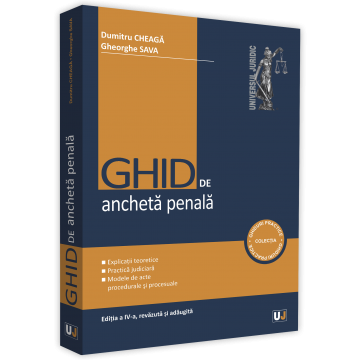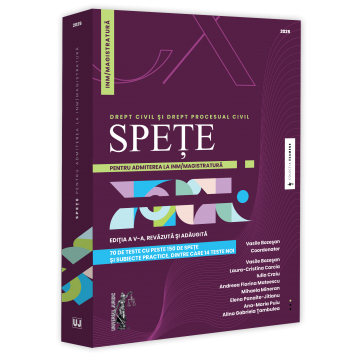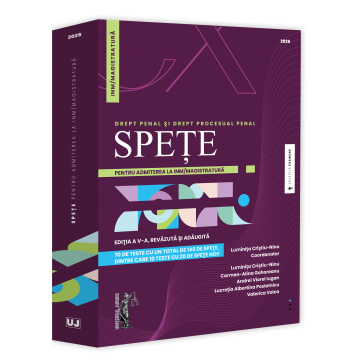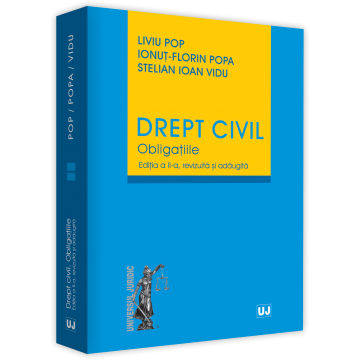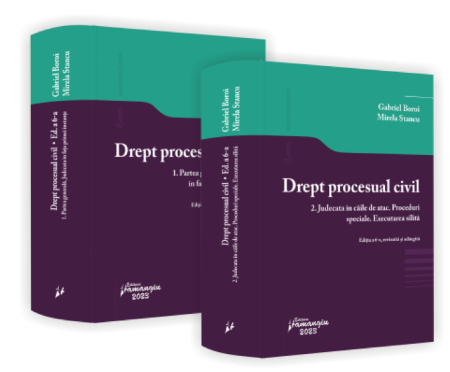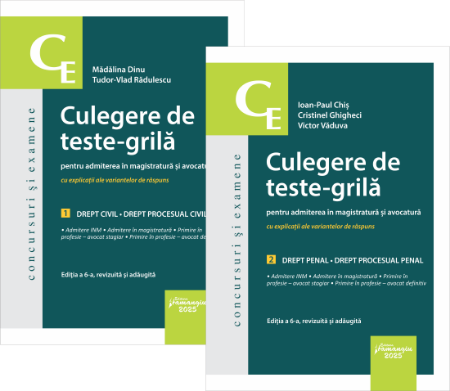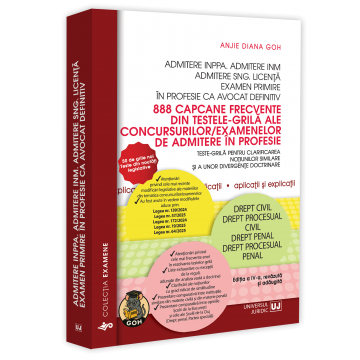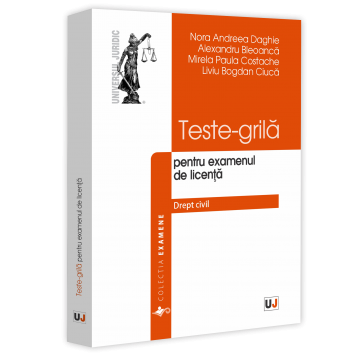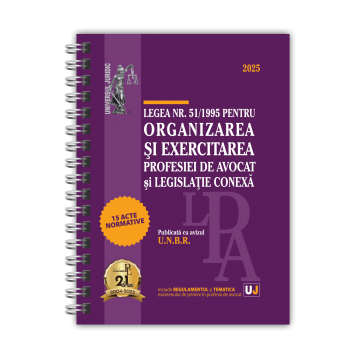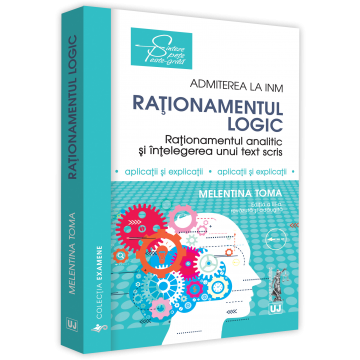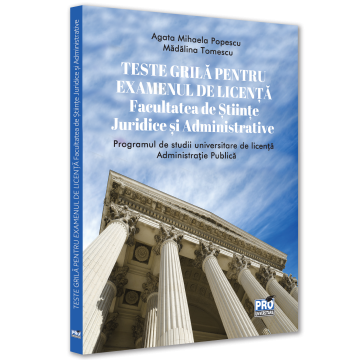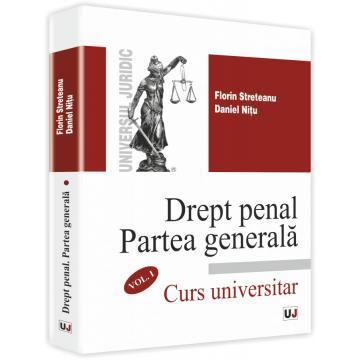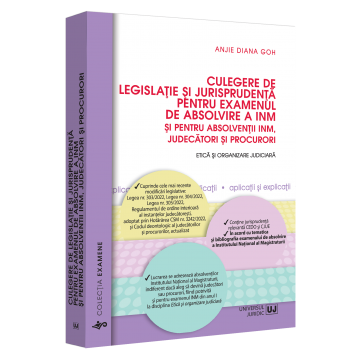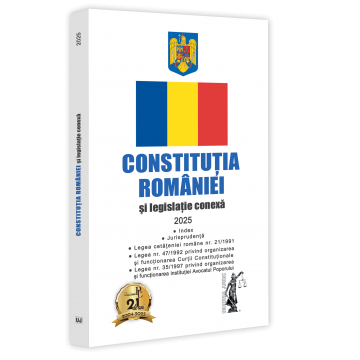ISBN: 978-606-28-0464-0
DOI: 10.5682/9786062804640
Publisher year: 2016
Edition: I
Pages: 514
Publisher: Editura Universitară
Author: Marius Andreescu
- Description
- Download (1)
- Authors
- Content
- More details
- Reviews (0)
-
Filosofie, credinta si drept
Download
FOREWORD / 9
PRINCIPLES OF LAW. THE PHILOSOPHICAL APPROACH. / 12
ABOUT / THE POSSIBILITY / AND / USEFULNESS / OF THE PHILOSOPHY OF LAW, WITH APPLICATION TO THE PRINCIPLES OF LAW / 29
CRISIS OF JUSTICE AND JUSTICE OF CRISIS / 36
CHRISTIAN AND PHILOSOPHICAL BASES OF THE PRINCIPLE OF PROPORTIONALITY / 47
UNITY AND TIMELINESS OF LAW / 83
PROPORTIONALITY, AS A CONSTITUTIONAL PRINCIPLE / 101
PRINCIPLE OF PROPORTIONALITY, CRITERION LEGITIMACY IN THE PUBLIC LAW / 111
APPLICATION OF THE PRINCIPLE OF PROPORTIONALITY IN CASE OF RESTRICTIONS ON THE EXERCISE OF CERTAIN RIGHTS / 120
CONTRIBUTIONS OF THE ROMANIAN LEGAL DOCTRINE TO THE CONSTRUCTION OF THE PROPORTIONALITY PRINCIPLE / 135
THE CONSTITUTIONAL PRINCIPLE OF EQUALITY. LEGAL MEANINGS AND SOCIAL IMPLICATIONS / 152
APPLICATION OF THE CONSTITUTIONAL PRINCIPLE OF PROPORTIONALITY TO THE STATE ORGANIZATION / 166
PRINCIPLES OF PROPORTIONALITY CONTRIBUTION OF PHILOSOPHY AND JURIDICAL DOCTRINES / 183
PRINCIPLE OF THE PRIORITY OF THE LAW OF THE EUROPEAN UNION TO THE NATIONAL LAW. LEGAL CONSEQUENCES / 206
THE CONSTITUTION BETWEEN IDEAL AND REALITY / 217
REFLECTIONS ON CONSTITUTIONAL REFORM. CONSTITUTIONALITY OF THE RIGHT TO GOOD ADMINISTRATION / 231
CODIFICATION REQUIREMENTS APPLIED TO THE REGULATORY CONTENT OF THE CONSTITUTION / 253
GUARANTEE OF THE SUPREMACY OF THE CONSTITUTION THROUGH JUDICIAL CONTROL OF LEGAL ACTS ISSUED WITH EXCESS OR UNCONSTITUTIONAL POWER / 265
RECEIPT / PRINCIPLE OF THE SUPREME OF THE CONSTITUTION AND ITS CONSEQUENCES IN THE NEW CRIMINAL CODES / 282
CONSTITUTIONALITY OF THE APPEAL IN THE INTEREST OF THE LAW AND THE DECISIONS DECIDED / 290
THEORETICAL AND JURISDICTION ASPECTS REGARDING THE CONSTITUTIONALITY OF THE APPEAL IN THE INTEREST OF THE LAW / 308
DELIMITATION OF THE DISCRETIONARY POWER FROM THE POWER EXCCES IN THE ACTIVITY OF THE STATE`S AUTHORITIES / 327
ASPECTS OF DOCTRINE AND JURISDICTION REGARDING THE APPLICATION OF ART. 20 OF THE CONSTITUTION / 335
POWER AND DEMOCRACY / 349
MONARCHY / CONSTITUTIONAL / AND REPUBLIC OF THE ROMANIANS. CONSTITUTIONAL ASPECTS / 371
FREEDOM / CONSCIOUSNESS. LEGAL, PHILOSOPHICAL AND RELIGIOUS IMPLICATIONS / 383
IN THE NAME OF FREEDOM OF CONSCIOUSNESS / 397
FREEDOM OF SPEECH. LEGAL AND THEOLOGICAL MEANINGS AND IMPLICATIONS / 407
THE DOCTRINE OF SOCIAL CONTACT. THOMAS HOBBES. BRIEF HISTORICAL CONSIDERATIONS. / 425
JOHN LOCKE - FOREIGNER OF CONTEMPORARY LIBERALISM AND CONSTITUTIONALISM / 436
MAN, SOCIETY AND THE STATE IN THE PHILOSOPHICAL AND POLITICAL THOUGHT OF JEAN JACQUES ROUSSEAU / 447
SOVEREIGNTY. GOVERNMENT. DEMOCRACY. The JEAN JACQUES ROUSSEAU / 460
ONSTANTIN NOICA. A CHRISTIAN PHILOSOPHER / 470
HISTORY UNDERSTANDED AS PROGRESS IN THE CONSCIOUSNESS OF FREEDOM. THE IDEA OF FREEDOM IN THE WORK OF NICOLAE IORGA / 481
LIVIU / REBREANU, PROMOTER OF TRADITIONAL EXISTENCE AND CULTURE - ROMANIAN CHRISTIANS / 487
MOMENTS / AND / MONUMENTS / OF / SPIRITUALITY IN ARGESEAN AND NATIONAL CULTURE / 497
THOUGHT DROPS / 510
There is during the time we have been given moments of meditation, a return of thought to oneself, in the natural attempt and desire to discover meaning and permanence in the externalizations of the written word, often scattered in themes and arguments whose content unity is sometimes impossible. notified without this return of thought on what the word has already expressed. Such a reflection in the search for archetypes or meanings defeats the linear determinism of time because man proves capable, through his thinking and contemplation, to travel through time and, especially, to discover and even give meaning where it apparently does not exist. The purpose of man's existence in his natural dimension of spiritual and free personality can be characterized by the words of the great philosopher Constantin Noica: "Do not forget that God sent you into the world to replace him, to give meaning, to create, to lead his beginning before . Make sure you don't waste your time ”(De Caelo).
Through this collection of studies we propose such a reflection on various topics, but whose unity of meaning, in our opinion, can be identified by three values that form the very title of our work: "freedom, faith and law." This triad does not express only simple concepts, but is an elevation of the categories of thinking to the level of value ideas. The idea is not a simple description of the object of experience, but a reflection, a judgment on the notions on which it is based.
Immanuel Kant said that: "Our reason naturally rises to knowledge that goes far beyond what can ever correspond to an object that experience can give, but which still have their reality and are by no means simple. chimeras ”(Critique of pure reason). In this sense, we argue that the science of law can not be limited only to the normative, doctrinal or jurisprudence dimension, but is more than that, it is a unitary value system, which can be found through ideational reflection, primarily in the general principles of law, and hence in its norms and, in general, in the act of justice. Undoubtedly, freedom is the basis of any normative democratic structure and the essence of law. Kant states that: "Therefore, law is the totality of the conditions under which the free will of one man can unite with the free will of another man, according to a universal law of liberty" (Metaphysics of Morals). Freedom, as an ontological state of law, is the idea, the archetype, that we try to highlight in the present studies. Through the idea of freedom, law has a natural purpose: man, in his social manifestations, but also as a spiritual person. Only by accepting freedom as the essence of law, the entire legal system has its natural meaning and finality: man. That said, man is not for the law, but the law is for man, not to constrain him, but to guarantee his natural freedom. Awareness of this value dimension of law and, in general, of the entire human existence, represents the meaning of the historical evolution of each person, but also of society as a whole, as Hegel said: "History is progress in the consciousness of freedom."
The elevation of freedom from a simple legal declarative aspect to a fact of conscience cannot be achieved only through the normative determinations of a legal system or through the existential situations in which man is forced to manifest. It takes more than that, namely faith. With justified reason, Father Arsenie Boca said: "Christianity has made people aware of their freedom." The same great Romanian theologian states that: "Freedom of conscience is the deepest spiritual good that man has at his disposal." That is why we emphasize the important role of faith, of deep living in consciousness, of the truths of faith, this being the basis, the deep meaning of both existence and the right understood by the idea of freedom!
In this context, the law is not only a simple normative form of a political will but an archetype and a form that expresses a value sense of the legal structure, through which legal order is established but also social order. But for this the law must be not only bearers of norms but especially bearers of values. And the main value that should be found in the deeper reality of the norms contained in the law is justice. At this level, the highest normative expression of legal principles, social and Christian values is the Constitution. We understand the fundamental law not only as a simple superior normative act through its legal force, but especially as a "political and legal settlement of the whole society", as the late professor Ion Deleanu rightly states. At the same time, any constitution of a democratic society is the expression of the social contract between the state, the society and each member of the society, the form of achieving harmony and social balance in its dynamics. The studies present in this volume on the social contract want to emphasize the topicality of this topic and the value meanings of the constitution and constitutionalism.
The ideational system is not independent of its creators, although through its promoted values and permanence it can overcome the ephemeral existence of the one who created it. We considered it useful to include in this volume studies referring to some personalities in the cultural space, including the legal one, precisely to emphasize the role and importance of personality in configuring an 11 ideational system of values that society, in becoming free. , can only take it over with those who created it. It is affirmed as a fundamental principle of state existence, for any democratic society, the supremacy of law and law, a justified statement if it remains to the social and normative phenomenality, to the rule of law or to what can be called the legal state of man. But there is something deeper and, at the same time, higher than the phenomenality of the law and social order, namely freedom, which, moreover, is the only one able to support the social and normative system of a state.
Therefore, through the content of this volume, explicitly or implicitly, we try to affirm our belief in the principle of the supremacy of freedom from which the supremacy of the law derives. The application of this principle has as a consequence a social transformation that can sometimes be seen in history, the transition from mass democracy, specific to the rule of law, to democracy of freedom, a state that will characterize, perhaps, society reached the level where man no longer lives. according to the principle "one next to the other", or freedoms no longer coexist next to each other, but man exists, works thinks feels "together with each other" so that in this way the principle of coexistence of freedoms is to one person in relation to another, but especially in its true and profound sense: the condition of my freedom is the freedom of the other according to a universal law of value. There is something else to add, namely that the three value dimensions of the science of law and of a legal and social system - freedom, faith and law - are contained in the reality of justice. The judge is the one who "says the law", therefore he must submit to his own conscience in whose content the values of the Christian faith must be found, in order to apply the law not in order to achieve an abstract justice, but for man, for his freedom. This volume, which includes studies held at various congresses, conferences or seminars, is addressed to any reader, regardless of profession, but who is concerned with finding meaning and significance in the phenomenal, often overflowing, legal and social.
Judge Dr. Marius Andreescu

6359.png)
![Philosophy, faith and law - Marius Andreescu [1] Philosophy, faith and law - Marius Andreescu [1]](https://gomagcdn.ro/domains/editurauniversitara.ro/files/product/large/filosofie-credinta-si-drept-571-332511.jpg)
